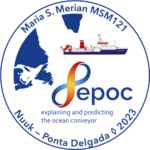
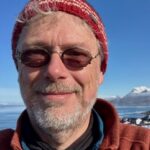
Christian Mertens, University of Bremen: Cruise leader
I am a physical oceanographer working at the University of Bremen. I am particularly interested in the variability of the ocean over a range of time scales from multi-year to short-term fluctuations. I use a wide range of methodological approaches and instrumentation to study the large scale ocean circulation as well as small-scale processes mixing. As the chief scientist on Maria S. Merian cruise MSM121 to the Grand Banks of Newfoundland and Flemish Cap I am responsible for the scheduling and many other organisational aspects. Scientifically I take care of the deployment of an array of 14 bottom-mounted instruments (inverted echo sounders) that we want to use to measure time series of the transport of the so-called Deep Western Boundary Current (DWBC) south of Flemish Cap. In particular, we are interested in the amount of water leaving the southward flowing DWBC and returning northward as part of the North Atlantic Current.
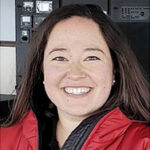
Eleanor Frajka-WIlliams, Universität Hamburg
I am a professor at the Institute of Oceanography, Universität Hamburg and coordinator of the EPOC project. On this expedition, I am looking after the drift-free bottom pressure recorders. When measuring the AMOC in situ, we typically use the principle of geostrophy based on ocean densities, but the transport calculation requires a constant of integration or ‘reference’. If we had perfect measurements of ocean pressure, we could directly measure the reference velocity but pressure sensors suffer from drift over time. With the new type of sensors we’re deploying on MSM121 (and the sensors deployed earlier this year at 26°N) we will evaluate whether they can solve the ‘reference level problem’ for AMOC measurements.

Damien Desbruyeres, Ifremer
I am a physical oceanographer at LOPS-Ifremer and responsible for a component of the EPOC fieldwork. I coordinate and lead the deployment of nine tall moorings equipped with current meters and temperature/conductivity/pressure sensors, as well as four pressure inverted echo sounders (PIES). This array is being deployed during this expedition around Flemish Cap and the Grand Banks of Newfoundland and will stay nearly two years in the water. The general idea of this experiment is to be able to measure, simultaneously, the variability of the deep western boundary current upstream (i.e. at subpolar latitudes) and downstream (i.e. at subtropical latitudes) of the key Transition Zone of the North Atlantic. It will be later complemented by high-resolution measurements (hydrography survey, microstructure, tow-yos, …) to ultimately unravel how this Transition Zone contributes to maintain or breaking the meridional coherence of the Atlantic Meridional Overturning Circulation.
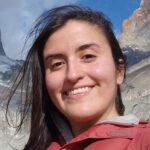
Maria-Jesus Rapanague, Max Plank Institute for Meteorology
I am a second-year PhD student in physical oceanography at the Max Planck Institute for Meteorology. My research is about the meridional connectivity of the AMOC and the mechanisms driving it, I find it a very challenging and interesting topic. This is my first scientific cruise, and it has been one of my dreams since I was studying for my bachelor’s degree in Chile. Outside research, one of my passions is science communication, so I am very excited about writing the blog, I hope you enjoy it!
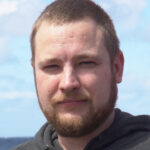
Ilmar Leimann, University of Bremen
I am a physical oceanographer and a PhD student at the University of Bremen. My interest is in ocean processes at different scales, ranging from 10,000 to 1,000 km (basin scale), to very small scales down to 1 m. Currently, I am focusing on the question of what happens to the energy in the ocean at scales ranging from 1,000 km to 10 m. On the expedition I will be responsible for Pressure Inverted Echo Sounder (PIES), lowered ADCP and shipboard ADCP, and I will be helping out with the expedition blog.
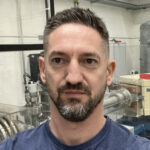
Duncan Dale, ETH Zurich
I am exactly halfway through a PhD as a physical and tracer oceanographer at ETH Zurich. I am part of the TITANICA project that uses artificial radionuclides (aka nuclear waste) released from nuclear reprocessing plants to trace ocean circulation around the Arctic Ocean and Subpolar North Atlantic. I find it thrilling to actually go and collect seawater from key locations and measure isotopes that have been produced in nuclear reactors using sophisticated Accelerator Mass Spectrometry (AMS). When I’m not doing that, I’m usually found crushing it at any karaoke I can find!
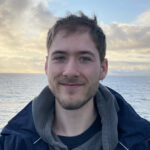
Stefan Pauls, University of Bremen
I am at the end of my bachelor studies in physics at the University of Bremen. Being an environmental physicist, I am focused on oceanography, or more precisely on the coherence of Labrador Current variability from satellite altimetry. On this cruise – my first one – I will be a part of the group measuring the conductivity, temperature and depth (CTD) and also the currents using lowered ADCPs. I am also partly responsible for the tracer measurements (FCKWs and SF6). Besides that I am looking forward to learning about the general process of a cruise regarding science and also the technical aspects.
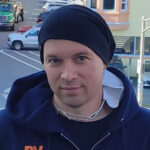
Jürgen Stake
Hello, Jürgen here. My alma mater is the University of Bremen, where I studied physics and thus came to physical oceanography. I am responsible for the technical part of the expedition, and on this voyage specifically for the many ground echosounders we will be using. It’s great to be part of the oceanographic community and to do my part for ocean exploration.
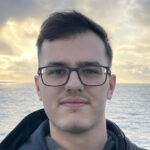
Lukas Dirksen
I am an apprentice to a chemistry laboratory technician at the Universität Bremen. On this expedition I will be responsible for the quantitative oxygen measurements of the Atlantic Ocean water in the ship’s chemistry laboratory and will be taking part in the collection and storage of trace CFC and SF6 water samples
For the oxygen measurement I will be using a standardised “Winkler” method with is a titration based measurement. When I was starting my apprenticeship I was not expecting (nor was I aware) that there would be a possibility to take part in such a cruise, yet here I am! I am thrilled to be here and meet the people with more experience at sea. I enjoy working at sea (with only mild swell!) and I love the views from the deck.
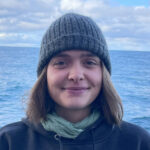
Viktoria Nikolaus
I’m currently pursuing a Master’s degree in Ocean and Climate Physics at Universität Hamburg, with a focus on physical oceanography. During this research cruise, my role involves operating scientific instruments such as the rosette sampler, CTD, and LADCP. Additionally, I assist with the drift-free bottom pressure recorders.
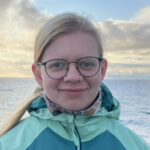
Lara Aschenbeck
I am a masters student in physics at the University of Bremen. I’m currently working on my master’s thesis in the Physical Oceanography group. My topic is about the variability of the deep western boundary current at 47°N. So I’ll be looking at data from moorings, LADCP and satellite altimetry. This is my second cruise and on the ship I’m working with CTD, LADCP and helping with PIES. I’m really happy to be working in the same region as my master’s thesis takes place and to have the opportunity to see how the data is measured.
Home page | Expedition blog | Mission overview | Dive deeper

EPOC is funded by the European Union. Views and opinions expressed are however those of the author(s) only and do not necessarily reflect those of the European Union. Neither the European Union nor the granting authority can be held responsible for them.